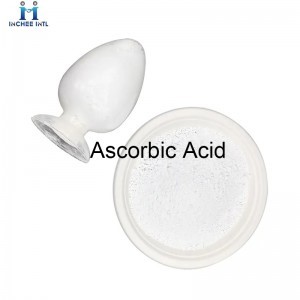Brief introduction:
When it comes to essential nutrients for our body, Ascorbic Acid, also known as Vitamin C, stands out as a true champion. This water-soluble vitamin plays a crucial role in various metabolic processes, promoting growth, enhancing resistance to disease, and serving as a powerful antioxidant. In addition, it has an array of uses as a nutritional supplement and even as a wheat flour improver. However, like everything in life, moderation is key, as excessive supplementation may be detrimental to your health.
 Physical and Chemical Properties:
Physical and Chemical Properties:
Chemically named L-(+)-sualose type 2,3,4,5, 6-pentahydroxy-2-hexenoide-4-lactone, Ascorbic Acid, with its molecular formula C6H8O6 and molecular weight of 176.12, exhibits a myriad of enchanting properties. Often found in flaky or needle-like monoclinic crystals, it is completely odorless but boasts a characteristic sour taste. What makes Ascorbic Acid truly unique is its remarkable solubility in water and impressive reducibility.
Function and benefit:
One of the key features of Ascorbic Acid is its participation in the complex metabolic process of the body. It acts as a vital co-factor in numerous enzymatic reactions and plays a critical role in collagen synthesis, making it essential for wound healing and tissue repair. Moreover, this remarkable nutrient stimulates the production of white blood cells, boosting the immune system and enhancing our resistance to diseases.
Recognized as a nutritional supplement, Ascorbic Acid offers countless benefits. Its powerful antioxidant properties protect our cells from harmful free radicals, reducing the risk of chronic diseases and promoting overall well-being. Additionally, it aids in the absorption of iron from plant-based foods, ensuring optimal iron levels and preventing iron deficiency anemia.
Beyond its health-promoting effects, Ascorbic Acid can be utilized as a wheat flour improver. Its natural reducing properties enhance gluten formation, resulting in improved dough elasticity and better bread texture. By acting as an oxidizing agent, it also strengthens the gluten network, providing increased volume and better crumb structure.
However, it’s important to note that excessively supplementing with Ascorbic Acid can have adverse effects on your health. While there is no denying the incredible benefits it offers, it is critical to use this nutrient in a reasonable manner. Always consult with a healthcare professional to determine the correct dosage for your specific needs.
Not limited to its benefits for human consumption, Ascorbic Acid plays a crucial role in laboratory settings as well. It serves as an analytical reagent, finding utility as a reducing agent and masking agent in various chemical tests. Its ability to donate electrons makes it an invaluable tool in qualitative and quantitative analyses.
Product packaging:
Package:25KG/CTN
Storage method: Ascorbic Acid is rapidly oxidized in air and alkaline media, so it should be sealed in brown glass bottles and stored away from light in a cool and dry place. It needs to be stored separately from strong oxidants and alkali.
Transportation precautions: When transporting Ascorbic Acid, prevent the spread of dust, use local exhaust or respiratory protection, protective gloves, and wear safety glasses. Avoid direct contact with light and air during transportation.
In conclusion, Ascorbic Acid, also known as Vitamin C, is a remarkable water-soluble vitamin that offers a wide range of benefits. From promoting growth and enhancing resistance to disease to serving as a nutritional supplement and wheat flour improver, its versatility knows no bounds. Nonetheless, always ensure that you use this nutrient in a reasonable manner to reap the rewards without risking your health. Let Ascorbic Acid be the shining star in your journey towards optimal health and well-being.
Post time: Aug-07-2023







